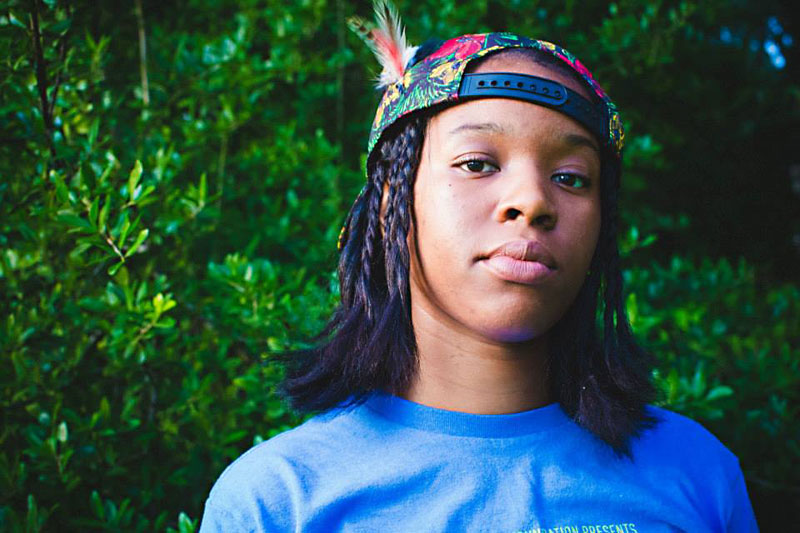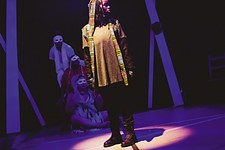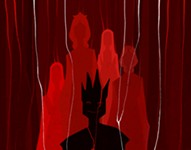Getting Political With The Tree Play and Robin Hood: An Elegy
Two new Austin plays tackle timely subjects
By Robert Faires, Fri., Aug. 7, 2015
Theatre in summer can often feel like just a thicket of musicals. Every other show seems to be some all-singing, all-dancing spectacle, with crooning Okie cowpokes or boogieing Baltimore teens crowding the stage to lift our spirits in the dog days, to distract us from the oppressive heat. And those masses of Guys and Dolls and Sophisticated Ladies and Damn Yankees and Dreamgirls and Cats are no mere mirage. This season has seen a full 20 musicals open on area stages in the 10 weeks since Memorial Day, and another four will strike up the band before Labor Day arrives.
Still, summer theatre in Austin isn't always Into the Woods. Sometimes it's The Tree Play – that is, a locally generated drama geared more toward putting your mind on something than taking your mind off it, that has a message about the world we're living in today and an urgent need to deliver it now. In the case of The Tree Play, the message is about the environment – specifically, the rain forests, and the action we need to take to preserve and protect them before it's too late. It's theatre that is, for lack of a better word, political, which is something we see surprisingly little of in our town, given how fond Austinites are of both making plays and butting heads over politics. Of the 90 or so original plays created in this city every year, only a handful can be said to engage in timely societal issues in a direct manner. They're rare in any season.
So it's rather remarkable to have a pair of homegrown political plays sprout in the thicket of musicals the very same summer weekend. The day after The Tree Play launches its brief run (Aug. 6-8) at Ground Floor Theatre, Robin Hood: An Elegy premieres at the Vortex. Running Aug. 7-22, this work by the Generic Ensemble Company, aka GenEnCo, uses the familiar myth of the Sherwood Forest outlaw to confront state-sanctioned racism and violence against black people in both Robin's time and ours. Embedded in the play's bones is #blacklivesmatter, and the company felt compelled by the movement and the momentum it's generated in the national dialogue about race and violence to provide another space for discussion. This is about as timely as theatre gets.
For those of the mind that summer equals popcorn entertainment, that it just ain't the time for timely, such overt engagement with political themes may seem quite off-putting to audiences. But the artists behind Robin Hood: An Elegy and The Tree Play think that's selling local theatregoers short. "I think audiences will seek out a good story no matter the content," says Robi Polgar, The Tree Play's writer-director. "Austin audiences are sharp. Give them the opportunity to experience art that treats them as intelligent, intrepid, and open-minded, and they'll seek out those projects." Krysta Gonzales, the playwright for GenEnCo's production, is equally confident: "I have faith that Austin audiences are hungry for bold new work that takes risks and takes a stance. And the messages conveyed in Robin Hood: An Elegy are extremely urgent and necessary – regardless of whether or not audiences are ready. Honestly, are we ever ready for any of the messages or experiences that are of such magnitude? If artists waited until it was a good time to illuminate difficult truths, we would probably have never met the likes of Danitra Vance, Rhodessa Jones, Maya Angelou, Nadia Davids, just to scratch the surface here. Who knows where we'd be?"
For kt shorb, GenEnCo's artistic director and director of Robin Hood, it's key to create the right environment for the audience: "Due to fear and laziness, we sometimes talk down to audiences, and that is just not necessary. I believe all audiences are capable of absorbing a lot; they just need to be given the space to do so. One of my favorite teachers, Anne Bogart, says that you teach the audience how to watch during the first five minutes of the play. I see the work of GenEnCo as continuously 'teaching the audience how to watch' this kind of work, i.e., politically engaged, physical, experimental content. Of course, this is not a one-way conversation. We have high expectations as to what the audience can watch and absorb, and we also try to listen to what the audience needs in order to process, heal, find release, or be challenged. Some people just won't 'get' it, either politically or aesthetically. But we need to be brave and hold on to the possibility that the right people will see our work and have conversations with each other and other people and then take what they saw into their lives. Ultimately, theatre takes up so much time and energy that unless it provokes deep thought and fosters a sense of critical community through challenging the audience – as well as it entertains – we might as well be watching TV."
Of course, for the artists of both these shows, the commitment to political theatre is nothing new. "I've been doing creative work that affirms and amplifies the experience of people of color in the United States since I was 13 years old," says Gonzales. And shorb says, "I can't think of any work I've been a writer or director for that hasn't had a clear political idea behind it. My first time onstage in Austin, I explored race and gender expression for Asian-Americans. GenEnCo's mission is to 'make the invisible visible through bold, socially relevant, body-centered theatre,' so political ideas are always present." Likewise for Polgar, whose career extends across four decades: "I've always gravitated toward creating work that has a political dimension: in the plays or songs I've written or how I've chosen to approach plays I've directed. I'm compelled to find ways to challenge audiences to think about big questions that take us beyond our daily lives."
When that impulse is so much a part of your character, the world around you is full of sparks that can ignite a creative project. Polgar, who with his wife Michelle ran the Public Domain Theatre on Congress in the Nineties, had been out of the theatre-making game for several years, but then he read an article in The New Yorker by Jon Lee Anderson, "Murder in the Amazon." "It pushed all my buttons," he says. "The state working against its people for the benefit of big agribusiness. Hit lists of pro-environment activists, peasants, businessmen. A class struggle that also pit neighbor against neighbor. The profound selfishness of it all. The waste of nature and of human life. Reading the piece, an image came to me so I pulled out a spiral binder and started to write. I had a first draft in a week."
It took another four years for Polgar to bring that draft to production, but The Tree Play premiering this week has clearly grown from the seeds of that early version. It's a "play with movement," in which the physical interaction between the humans and the forest around them is as important as the story of the rain forest's destruction. "I wanted the characters and the trees to dance together," says Polgar. "And I wanted the audience to sit 'in the forest' somehow." To that end, audience members are encouraged to bring a blanket or pillow to sit on for the 45-minute performance.
The Violence Is Not New
Given what has already been said about Robin Hood: An Elegy, the spark for the play is already pretty clear. But it's worth noting that the original concept for the drama was somewhat different. "The idea of Robin Hood had been percolating in the company for several months last year," says shorb. "At that point in time, it was more about general state-based repression, so we were talking about maybe having a love story about queer people of color. At that point, Krysta volunteered to create a text. Then the Eric Garner verdict and the ensuing protests happened, and it all came into focus what kind of state-based repression was at the fore, and what was the most urgent. The whole company agreed this was the right direction to go with this idea. This violence is not new. But something about the collective consciousness is picking up on the violence and absurdity of how systemic this situation is. Now is when a critical mass of people – both in Austin and nationally – are actually seeing and hearing and finally believing that this is a reality."
To forge this particular work, though, the company had to allow for speech. "This is a play about blackness, and I am not black," shorb says. "Most work I've led in the past has had very clear connections to my lived experience, so adjusting to making decisions based not on my own history but on my collaborators' histories has been very illuminating and new. Sometimes I step back and ask my black collaborators to make certain decisions about representation. What I've noticed about this is it has made the work much more straightforward, and in some ways brutal, than anything I've ever made. We are in consensus to be as aware and awake as possible, which means that sometimes we confront realities that are alarmingly painful – such as the history of lynching, which continues today. Of course, when I see my fellow collaborators encountering a kind of release through this process, I realize that this is precisely the release we need to be providing the audience. That steadies my hand. It is truly humbling to examine my own fears and desires in this way, and I'm honored to have found brilliant people with whom to do it."
Release – there's a concept that doesn't get connected to political theatre often enough. If it did, it might not strike some theatregoers as scary. "I don't think I've ever worked on something I was concerned would scare audiences away," says Gonzales. "Even if that was at the forefront of my mind, I believe that it's in those tense, scary, uncomfortable spaces that the biggest breakthroughs and awakenings occur, artistically and personally. Creating pieces that are overtly political squashes the elephant in the room, leaving enough space for the artists and audience to leap into work that's riveting and moving."
Polgar also believes strongly that there's no need to be afraid of a good political drama (or comedy). "The best political plays don't push a point of view," he says. "The best political plays engage audiences with compelling characters who struggle to resolve the seemingly unresolvable. Confronting issues of the day can make for satisfying drama. But you can't push an agenda on anyone because that's disrespectful. A good political drama presents the issue, shows the characters struggling with it, and gives the audience opportunities to consider where they stand. Sometimes it asks them what they might do to improve the world. I hate in-my-face polemics. But I love a good piece of theatre that makes me reconsider my concept of the world, especially when it's done in a way that's peopled with interesting characters and that tells a good story in unexpected ways. And that probably makes me laugh or amazes me.
"Most political theatre preaches to the converted. As a vehicle for getting a message out, theatre has a short reach, unlike books, film, television, the Internet. But it's visceral in ways other media can't match. I'm drawn to that interaction between a group of people sharing a space with a group of performers telling a story. Maybe experiencing this play will influence our audience to take some sort of positive action, no matter how small."
The Tree Play runs Aug. 6-8: Thu., 7:30pm; Fri., 7:30 & 9pm; Sat., 4, 7:30, & 9pm, at Ground Floor Theatre, 979 Springdale. For more info, visit www.fb.com/thetreeplay.
Robin Hood: An Elegy runs Aug. 7-22: Thu.-Sun., 8pm, at the Vortex, 2307 Manor Rd. For more info, visit www.vortexrep.org.












